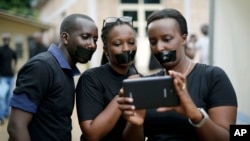Dozens of Burundian journalists gathered in the capital, Bujumbura, calling for the government to give the media space to operate freely, the call coming days after the government shut down privately owned radio and blocked some social media sites.
Burundian journalists marked World Press Freedom Day Sunday in silent protest, wearing black plain T-shirts and tape over their mouths to show the challenges they face as the country battles with demonstrations and political tension surrounding President Pierre Nkurzinza's controversial third term bid.
Netherlands Ambassador to Burundi Jolke Oppewal attended the rally and stressed the importance of a free press.
"Freedom of the press constitutes an essential element of the functioning of the democratic state in which journalists have an important role to play as kind of watchdogs of democracy. Without liberty of the press there is no access to information that is reliable and independent and that [is] at the heart of freedom of expression," Oppewal said.
After a week of protests, the Burundian government closed privately owned radio station, Radio Publique Africaine (RPA) and clamped down on social media websites that have been been used to organize protests against the third term presidential bid.
Patrick Wasso, RPA's presenter and producer, said he is angry he can no longer do his work.
"I feel sad today I cannot speak to my listeners and the public. I cannot go to the field to collect news and tell people what is happening around them," Wasso said.
Incitement accusations
The Burundian government has accused some media organizations of inciting the public, and supporting the opposition and demonstrators, an accusation denied by those media outlets.
Antoinne Kaburahe, head of Iwacu press group, said, "It is time to stay independent, neutral and professional in covering this event even if we have got difficulties in our work. Its in this situation that the big men are revealed and who do not have interest in the radicalism (politics) that some want to establish in Burundi."
Ambassador Oppewal called for dialogue between the country's media association and the government to enhance professionalism in disseminating information.
"We all know some radio stations when things get bad they can play a bad role. ... The responsibility of the media is quite big, closing them down means from the part of government you deny access of information. So, from both sides everything is to be done, open up dialogue, to open up communications, and that is a good. Professional journalism has a key role to play," he said.
Meanwhile, demonstrators are planning another wave of protests against President Nkurunziza's decision to run again.
Last week, visiting U.S. Assistant Secretary for Democracy, Human Rights, and Labor Tom Malinowski warned of "real consequences" if the crisis worsens.




